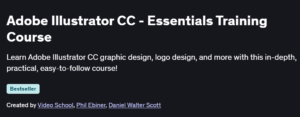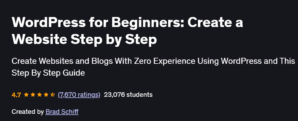Learn 3D Animation – The Ultimate Blender 4.3+ A-Z Guide
An extensive, project-based Blender course that equips you with the skills and confidence to create fully textured, rigged, and animated 3D scenes.
What will you learn in Learn 3D Animation – The Ultimate Blender 4.3+ A-Z Guide Course
Navigate Blender’s interface: 3D Viewport, Outliner, Properties, and workspace layouts
Model low- and high-poly assets using box modeling, edge looping, and sculpting techniques
UV-unwrap models, create PBR textures in Blender’s shader editor, and bake maps (normal, AO)
Rig characters and mechanical models with armatures, weight painting, and inverse kinematics
Animate objects and characters using keyframes, the Graph Editor, and NLA tracks
Render photorealistic images and animations with Cycles and Eevee, including lighting and compositing
Program Overview
Module 1: Blender Basics & Navigation
⏳ 1 hour
Topics: Interface overview, viewport navigation, selection modes, workspaces
Hands-on: Customize your startup file and navigate a sample scene
Module 2: Polygon Modeling Techniques
⏳ 2 hours
Topics: Extrude, bevel, loop cuts, modifiers (Mirror, Subdivision Surface)
Hands-on: Model a stylized prop (e.g., vase or stylus) with clean topology
Module 3: Sculpting & Retopology
⏳ 1.5 hours
Topics: Sculpt brushes, dynamic topology, multiresolution modifier, retopology tools
Hands-on: Sculpt organic details on a base mesh and retopologize for animation
Module 4: UV Unwrapping & Texturing
⏳ 2 hours
Topics: Mark seams, unwrap workflow, node-based material creation, PBR shader setup
Hands-on: UV-unwrap a complex model and build a principled BSDF material with image textures
Module 5: Rigging & Skinning
⏳ 1.5 hours
Topics: Armature creation, bone hierarchy, weight painting, IK/FK switching
Hands-on: Rig a simple character or mechanical limb and test deformations
Module 6: Animation Workflow
⏳ 2 hours
Topics: Keyframing, Graph Editor, Dope Sheet, NLA strips, shape-key animation
Hands-on: Animate a walk cycle or mechanical movement loop
Module 7: Lighting, Rendering & Compositing
⏳ 2 hours
Topics: HDRI vs. area lights, Cycles/Eevee settings, render layers, compositor nodes
Hands-on: Light a product shot, render in Cycles, and apply color grading in the compositor
Module 8: Final Project – Short Animated Scene
⏳ 3 hours
Topics: Project planning, scene layout, asset integration, final render settings
Hands-on: Create a brief animated sequence combining modeling, texturing, rigging, and lighting
Get certificate
Job Outlook
Blender proficiency is increasingly valued for roles in indie game development, animation studios, and freelance visualization
Positions include 3D Modeler, Character Animator, Environment Artist, and Motion Designer
Freelancers charge $30–$100+ per asset or $250–$800+ per finished animation; studio salaries range $50,000–$90,000+ annually
- Balanced mix of technical tools and creative workflows
- Real-world project modules consolidate learning into a tangible animated scene
- Covers both Cycles and Eevee, preparing you for various production needs
- Fast-paced for complete novices; prior 3D or Blender exposure recommended
- Does not delve deeply into physics simulations or advanced node scripting
Specification: Learn 3D Animation – The Ultimate Blender 4.3+ A-Z Guide
|
FAQs
- No prior experience is required; the course is beginner-friendly.
- It introduces Blender’s interface, tools, and basic concepts step by step.
- Hands-on exercises help learners understand modeling, texturing, and animation workflows.
- Familiarity with graphic design or basic computer skills can be helpful but not mandatory.
- By the end, learners can create complete 3D animations from scratch using Blender 4.3.
- Yes, the course covers creating 3D models using Blender’s sculpting and modeling tools.
- Learners practice applying materials, textures, and UV mapping for realistic visuals.
- Techniques include lighting, shading, and applying modifiers for efficient workflows.
- Hands-on exercises demonstrate creating assets for animation and rendering.
- Advanced modeling techniques like sculpting complex characters may require additional practice.
- Yes, the course teaches keyframing, rigging, and animating characters and objects.
- Learners practice movement, rotation, scaling, and timing to create fluid animations.
- Techniques include using the Graph Editor, Dope Sheet, and constraints for realistic motion.
- Hands-on projects guide learners from simple object animation to character movement.
- Advanced character animation may require additional study of rigging and motion principles.
- Yes, the course covers rendering techniques using Blender’s rendering engines (Eevee and Cycles).
- Learners practice setting up cameras, lighting, and output formats for animation projects.
- Techniques include optimizing render settings for quality and performance.
- Hands-on exercises help learners export videos and image sequences for projects.
- Advanced rendering effects like compositing or VFX may require further learning.
- Yes, learners can create complete 3D animation projects suitable for portfolios.
- Projects include modeling, texturing, animating, and rendering scenes from start to finish.
- Hands-on exercises provide practical skills that demonstrate proficiency in Blender.
- Portfolio-ready projects help learners showcase their abilities for internships or freelance work.
- Advanced portfolio work may require additional study or custom projects.





